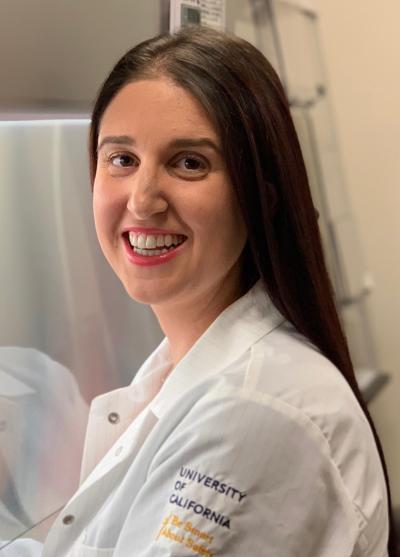
IMAGE: Rebekah Charney is a postdoctoral researcher in the School of Medicine at UC Riverside.
view more
Credit: UC Riverside
RIVERSIDE, Calif. — Rebekah Charney, a postdoctoral researcher in the School of Medicine at the University of California, Riverside, has received a five-year “Pathway to Independence” grant from the National Institute of Dental and Craniofacial Research of the National Institutes of Health, or NIH.
The career development grant will support Charney’s research on the role of critical genes in human neural crest cell development and craniofacial pathologies while facilitating her transition to an independent faculty position. The award provides approximately $200,000 for a two-year mentored phase, followed by three years of support for Charney to establish her own independent research group.
Charney, who joined UC Riverside in 2016 after receiving her doctoral degree at UC Irvine, explained that neural crest cells are an embryonic cell population that migrate extensively throughout the developing embryo. Among other derivatives, they contribute to most of the bone and connective tissue in the face. Improper development of the neural crest can lead to craniofacial birth defects. These craniofacial anomalies can occur on their own or as part of a broader syndrome.
One such disorder, Mowat-Wilson syndrome, affects facial structures, the central nervous system, and the heart, among other tissues and organs. While considered rare, this disorder is being increasingly diagnosed as more awareness is drawn to the different manifestations of the syndrome. Charney’s research aims to shed light on the mechanisms underlying Mowat-Wilson syndrome.
“Mutations in critical genes involved in neural crest cell formation and differentiation are the cause of numerous birth defects,” Charney said. “However, precisely how these mutations cause birth defects remain unknown.”
Using human pluripotent stem cells, Charney has been able to examine how the loss of these genes affects the earliest stages of human neural crest cell formation. With this grant, she will be able to establish translational models addressing neural crest-related disorders.
Charney noted that the outcomes of this research will not only address key questions of human neural crest cell formation but can help lead to the identification of novel diagnostic and therapeutic targets.
At UCR, Charney works in the laboratory of Martín García-Castro, an associate professor of biomedical sciences. She is joined in this award by a team of advisors and collaborators at multiple institutions across the country who specialize in dental and craniofacial development and Mowat-Wilson syndrome.
Charney is the recipient of a Ruth L. Kirschstein National Research Service Award Individual Postdoctoral Fellowship from the NIH and a K. Patricia Cross Future Leaders Award from the Association of American Colleges and Universities. At UCI, she received a U.S. Department of Education Graduate Assistance in Areas of National Need fellowship and an Edward Steinhaus Teaching Award; and was an NSF IGERT LifeChips trainee.
###
The University of California, Riverside is a doctoral research university, a living laboratory for groundbreaking exploration of issues critical to Inland Southern California, the state and communities around the world. Reflecting California’s diverse culture, UCR’s enrollment is more than 24,000 students. The campus opened a medical school in 2013 and has reached the heart of the Coachella Valley by way of the UCR Palm Desert Center. The campus has an annual statewide economic impact of almost $2 billion. To learn more, email news@ucr.edu.
TDnews














